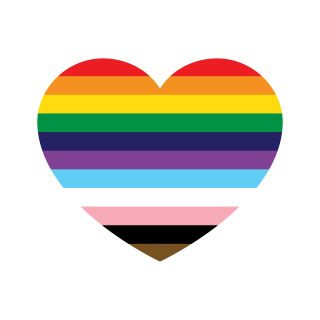Sexual Orientation
What Is Pride Month For?
Personal Perspective: Reflecting on coming out and queer history.
Posted June 3, 2024 Reviewed by Gary Drevitch
Key points
- Pride Month is meant to celebrate gender, sexuality, erotic and relationship diversities.
- Pride Month is also a time for self-care as hate towards LGBTQ+ people can increase.
- Pride Month is the occasion to remind ourselves that our "family of choice" is very important.

Pride Month should not be about businesses sticking the pride flag on their products for a month. It should be about celebrating the wide diversities of gender, sexuality, eroticism, and relationships. Of course, for LGBTQ+ people, celebrating their identities does not only happen in June; it is an everyday act of love towards themselves and other Queer people.
Even though LGBTQ+ people are protected by law in the U.K. and other liberal countries, Pride Month is still very much needed because homophobia, biphobia, and transphobia remain rife in our society. In fact, Pride Month is one of those times when many people holding homophobic, biphobic, and transphobic views become more vocal to protest against LGBTQ+ people. So, while Pride Month is a time of celebration, sadly, it needs to be a time of protection and self-care too.
Coming Out
Pride Month can be the occasion for LGBTQ+ people to “come out” to their family of origin and friends. Although coming out is a meaningful and crucial process for many LGBTQ+ people, it is important not to feel the pressure to do so if you don’t feel safe, or feel you are not ready for it. Coming out can actually be dangerous for people who live with families and communities that are highly homophobic, biphobic, and transphobic. Indeed, some people and communities do not uphold the human rights values and laws of liberal countries, usually due to religious or cultural beliefs.
Coming out is only necessary because of homophobia, biphobia, and transphobia. Cisgender heterosexual people don’t need to come out unless they do not fit the “norms". For example, kinky heterosexual people may feel the need to disclose their kink when they are dating. Coming out is the symptom of a world that still considers being cisgender heterosexual as “normal” and the rest as “other” or “alternative.” This is what we call heteronormativity. I think it is important for all of us to challenge heteronormativity because it hurts LGBTQ+ communities, and some heterosexual people too.
If you are an LGBTQ+ person growing up in a homophobic, biphobic, and transphobic community and want to come out, it is best to do so slowly, one step at a time. First, you can come out to a trusted friend whom you know will be safe. Later, you might want to come out to someone whose reaction you’re unsure about, but knowing that, if it goes wrong, you have some good and safe friends to shelter you. It is also OK to decide to never come out to some specific individuals or family members if you know they are likely to harm you for it.
History
As strange as it might seem, there was a time in human history when sexual orientations and gender expressions weren’t an area of discrimination. Evidence from ancient artifacts and art suggests that people of genders, sexualities, erotic and relationship diversities were integrated in society. For example, we found a jug in Greece depicting a sex worker and their customer dating back 470 BCE. In Italy, there was an Etruscan amphora from the 5th Century BCE depicting sex between two men. Sculptures of group sex dated back to the 11th Century are found in temples in India. And painted plates with erotic scenes of threesomes from the 4th Century BCE were found in Bulgaria, just to name a few. However, the integration of people with diverse sexuality, gender expressions and eroticism seemed to have stopped with the spread of colonisation and early Christianity, according to Hardy and Easton, authors of The Ethical Slut. Today, even people who do not belong to a particular religion may hold some strict ideas about sex and relationships, not realising that much of them are beliefs not truths. For example, the idea that monogamy is the gold standard and the rest is "alternative", or that masturbation is undesirable, are constructs and not part of human nature, as indicated by the scientific field of sexology. In some parts of the world untouched by colonisation, people who identify as non-binary are well integrated in their civilisations, such as people identified as "Two-Spirits" in the Navajo culture, people called Sekrata in Madagascar, and Hijras in South Asia, the latter of whom are believed to have sacred powers.
It is important to think about all those constructs, many of which we do not question but take as "truth". Some of those constructs might very well fit with some people, but they won't with others, especially with some Queer people. Examining those constructs and self-reflecting on sexual, erotic, and relational needs can be tricky for LGBTQ+ people because of the absence of good inclusive education and representations, but doing so can help Queer people live a more fulfilling and autonomous life without shame.
Queer Joy
Although there is still a long way to go before LGBTQ+ people can feel truly safe and accepted on our streets, it is important not to forget that they can inspire each other not only to survive in the world but to thrive, too. (I've written about this here.) By finding a “family of choice” and safe queer spaces, and by lifting each other up, they can access queer joy, an essential component to their resilience, and a path to learn to celebrate their existence unapologetically.
References
Hardy, J.W. & Easton, D. (2017). The Ethical Slut. 3rd ed. Ten Speed Press.
Butler, J. (2024). Who's Afraid of Gender? Allen Lane.
Barker, M.J. & Iantaffi, A. (2019). Life isn't binary. Jessica Kingsley Publishers.
Neves, S. (2023). Sexology: The Basics. Routledge.
Neves, S. & Davies, D. (2023). Erotically Queer. Routledge.


